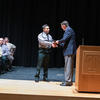Temple’s Park Ranger Law Enforcement Academy (PRLEA) is a full-time, 19-week program consisting of more than 700 hours of professional instruction designed to prepare and enable students to obtain employment with the National Park Service as a seasonal law enforcement ranger. The curriculum places particular emphasis on visitor and resource protection, federal law and procedure, authority and jurisdiction, natural and cultural resource management, officer safety and survival skills, and physical conditioning.
Upon successful completion of the program, students are awarded a certificate of completion from the Temple University Park Ranger Law Enforcement Academy (PRLEA) and the National Park Service-Law Enforcement Training Center (LETC). A public celebration that recognizes the significance of their achievement includes a graduation and awards ceremony for distinguished achievement in academics, marksmanship, driving, and physical fitness.
Eligibility requirements include:
Must be a minimum twenty-one (21) years of age by the time of PRLEA completion.
Must be a U.S. Citizen (males must be registered with the selective service).
Must hold a valid driver’s license.
Provide proof of private health insurance.
Meet medical and psychological fitness standards and provide proof of medical clearance to participate in physical activities.
Provide criminal and driver’s history checks.
Submit professional letters of reference.
Possess a minimum of forty-five (45) college credits successfully completed by the start of the program (prior military service with an honorable discharge may be substituted).
Agree to adhere to all program performance and conduct standards.
Submit a completed, signed application.
PRLEA is part of the Criminal Justice Training Programs, a division of the Temple University Department of Criminal Justice. CJTP has conducted professional training programs for a variety of criminal justice agencies and occupations since 1968. Today, more than 3,000 criminal justice professionals attend programs offered by CJTP each year, including police officers, deputy sheriffs, state constables, legislative security officers, magisterial district court staff, school resource officers, park rangers and crime prevention specialists. Other activities include continuing education programs for agencies allied to the criminal justice system and curriculum development, including distance-learning and online classes.

